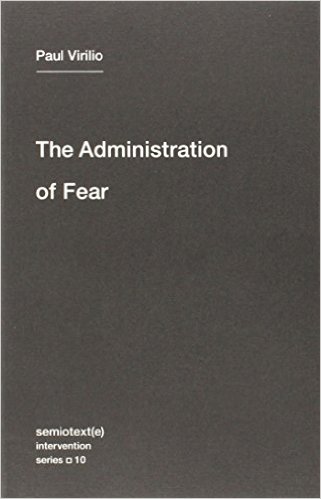
We are living under the administration of fear: fear has become an environment, an everyday landscape. There was a time when wars, famines, and epidemics were localized and limited by a certain timeframe. Today, it is the world itself that is limited, saturated, and manipulated, the world itself that seizes us and confines us with a stressful claustrophobia. Stock-market crises, undifferentiated terrorism, lightning pandemics, “professional” suicides…. Fear has become the world we live in.
The administration of fear also means that states are tempted to create policies for the orchestration and management of fear. Globalization has progressively eaten away at the traditional prerogatives of states (most notably of the welfare state), and states have to convince citizens that they can ensure their physical safety.
In this new and lengthy interview, Paul Virilio shows us how the “propaganda of progress,” the illuminism of new technologies, provide unexpected vectors for fear in the way that they manufacture frenzy and stupor. For Virilio, the economic catastrophe of 2007 was not the death knell of capitalism, as some have claimed, but just further evidence that capitalism has accelerated into turbo-capitalism, and is accelerating still. With every natural disaster, health scare, and malicious rumor now comes the inevitable “information bomb”―live feeds take over real space, and technology connects life to the immediacy of terror, the ultimate expression of speed. With the nuclear dissuasion of the Cold War behind us, we are faced with a new form of civil dissuasion: a state of fear that allows for the suspension of controversial social situations.
The most influential book of the past seventy-five years: a groundbreaking exploration of everything we know about what we don’t know, now with a new . . .
«Kanskje finnes det for latteren ennå en fremtid!», skriver Nietzsche i åpningen av Den muntre vitenskapen. Med satire og skarpe iakttakelser legger han blant annet . . .
Hvorfor gjør vi feil? Og hvorfor i all verden fortsetter vi å gjøre de samme feilene gang på gang? Vi tenker i ett av to . . .
«The planet is sick. Human beings are guilty of damaging it. We have to pay. Today, that is the orthodoxy throughout the Western world. Distrust . . .
Virilio’s exploration of the relationship between technology, war and information technology. “Civilization or the militarization of science?” With this typically hyperbolic and provocative question as . . .
With this book Paul Virilio inaugurated the new science whose object of study is the «dromocratic» revolution. Speed and Politics (first published in France in . . .
The Believing Brain is bestselling author Michael Shermer’s comprehensive and provocative theory on how beliefs are born, formed, reinforced, challenged, changed, and extinguishedSynthesizing thirty years . . .
«Verden er min forestilling.» Med denne påstanden innleder Schopenhauer sitt hovedverk fra 1818. Alt som kan erkjennes, er objekt for et subjekt. Omvendt gjelder det . . .
Michel Foucault takes us into the first two centuries of our own era, into the Golden Age of Rome, to reveal a subtle but decisive . . .
In this sequel to The History of Sexuality, Volume I: An Introduction, the brilliantly original French thinker who died in 1984 gives an analysis of . . .
Michel Foucault offers an iconoclastic exploration of why we feel compelled to continually analyze and discuss sex, and of the social and mental mechanisms of . . .
There is a catastrophe within contemporary art. What I call the «optically correct» is at stake. The vision machine and the motor have triggered it, . . .
“One day the day will come when the day will not come.” Bleak in its analysis of the social destruction wrought by modern technologies of . . .
Massive technological innovations now allow scientists to extract and analyze ancient DNA as never before, and it has become clear–in part from David Reich’s own . . .
‘Hinsides godt og ondt’ er en hyllest til livet og kreativiteten og på mange måter et endelig farvel med metafysikken. I åpningen sier Nietzsche at . . .
Taboo and sacrifice, transgression and language, death and sensuality—Georges Bataille pursues these themes with an original, often startling perspective. He challenges any single discourse on . . .
How would it be if what we take for human advance were simply a technological progress that literally leaves us out of its equations? What . . .
A trenchant critique of new techniques of waging war, and its reduction to images on a screen Written with his characteristic flair, Virilio’s latest book . . .
With around 645 million people expected to be displaced Ð by wars and other catastrophes Ð by 2050, Virilio begins The Futurism of the Instant . . .
The underlying premise of all of Virilio’s work is that we must analyzespeed and acceleration throughout history and see it as constitutive of historicalepochs. Continual . . .